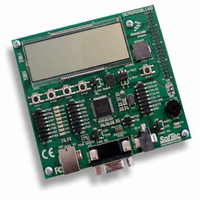DEMO9S08LC60 Freescale Semiconductor, DEMO9S08LC60 Datasheet - Page 283

DEMO9S08LC60
Manufacturer Part Number
DEMO9S08LC60
Description
BOARD DEMO FOR 9S08LC60
Manufacturer
Freescale Semiconductor
Type
MCUr
Datasheets
1.DEMO9S08LC60.pdf
(360 pages)
2.DEMO9S08LC60.pdf
(32 pages)
3.DEMO9S08LC60.pdf
(2 pages)
Specifications of DEMO9S08LC60
Contents
Evaluation Board
Processor To Be Evaluated
MC9S08LC60
Interface Type
RS-232, USB
Silicon Manufacturer
Freescale
Core Architecture
HCS08
Core Sub-architecture
HCS08
Silicon Core Number
MC9S08
Silicon Family Name
S08LC
Rohs Compliant
Yes
For Use With/related Products
MC9S08LC60
Lead Free Status / RoHS Status
Lead free / RoHS Compliant
- Current page: 283 of 360
- Download datasheet (4Mb)
15.4.4.2
A conversion is completed when the result of the conversion is transferred into the data result registers,
ADCRH and ADCRL. This is indicated by the setting of COCO. An interrupt is generated if AIEN is high
at the time that COCO is set.
A blocking mechanism prevents a new result from overwriting previous data in ADCRH and ADCRL if
the previous data is in the process of being read while in 12-bit or 10-bit MODE (the ADCRH register has
been read but the ADCRL register has not). When blocking is active, the data transfer is blocked, COCO
is not set, and the new result is lost. In the case of single conversions with the compare function enabled
and the compare condition false, blocking has no effect and ADC operation is terminated. In all other cases
of operation, when a data transfer is blocked, another conversion is initiated regardless of the state of
ADCO (single or continuous conversions enabled).
If single conversions are enabled, the blocking mechanism could result in several discarded conversions
and excess power consumption. To avoid this issue, the data registers must not be read after initiating a
single conversion until the conversion completes.
15.4.4.3
Any conversion in progress will be aborted when:
When a conversion is aborted, the contents of the data registers, ADCRH and ADCRL, are not altered but
continue to be the values transferred after the completion of the last successful conversion. In the case that
the conversion was aborted by a reset, ADCRH and ADCRL return to their reset states.
15.4.4.4
The ADC module remains in its idle state until a conversion is initiated. If ADACK is selected as the
conversion clock source, the ADACK clock generator is also enabled.
Power consumption when active can be reduced by setting ADLPC. This results in a lower maximum value
for f
15.4.4.5
The total conversion time depends on the sample time (as determined by ADLSMP), the MCU bus
frequency, the conversion mode (8-bit, 10-bit or 12-bit), and the frequency of the conversion clock (
After the module becomes active, sampling of the input begins. ADLSMP is used to select between short
(3.5 ADCK cycles) and long (23.5 ADCK cycles) sample times.When sampling is complete, the converter
is isolated from the input channel and a successive approximation algorithm is performed to determine the
Freescale Semiconductor
•
•
•
•
ADCK
A write to ADCSC1 occurs (the current conversion will be aborted and a new conversion will be
initiated, if ADCH are not all 1s).
A write to ADCSC2, ADCCFG, ADCCVH, or ADCCVL occurs. This indicates a mode of
operation change has occurred and the current conversion is therefore invalid.
The MCU is reset.
The MCU enters stop mode with ADACK not enabled.
(see the electrical specifications).
Completing Conversions
Aborting Conversions
Power Control
Sample Time and Total Conversion Time
MC9S08LC60 Series Data Sheet: Technical Data, Rev. 4
Chapter 15 Analog-to-Digital Converter (S08ADC12V1)
f
ADCK
283
).
Related parts for DEMO9S08LC60
Image
Part Number
Description
Manufacturer
Datasheet
Request
R
Part Number:
Description:
Manufacturer:
Freescale Semiconductor, Inc
Datasheet:
Part Number:
Description:
Manufacturer:
Freescale Semiconductor, Inc
Datasheet:
Part Number:
Description:
Manufacturer:
Freescale Semiconductor, Inc
Datasheet:
Part Number:
Description:
Manufacturer:
Freescale Semiconductor, Inc
Datasheet:
Part Number:
Description:
Manufacturer:
Freescale Semiconductor, Inc
Datasheet:
Part Number:
Description:
Manufacturer:
Freescale Semiconductor, Inc
Datasheet:
Part Number:
Description:
Manufacturer:
Freescale Semiconductor, Inc
Datasheet:
Part Number:
Description:
Manufacturer:
Freescale Semiconductor, Inc
Datasheet:
Part Number:
Description:
Manufacturer:
Freescale Semiconductor, Inc
Datasheet:
Part Number:
Description:
Manufacturer:
Freescale Semiconductor, Inc
Datasheet:
Part Number:
Description:
Manufacturer:
Freescale Semiconductor, Inc
Datasheet:
Part Number:
Description:
Manufacturer:
Freescale Semiconductor, Inc
Datasheet:
Part Number:
Description:
Manufacturer:
Freescale Semiconductor, Inc
Datasheet:
Part Number:
Description:
Manufacturer:
Freescale Semiconductor, Inc
Datasheet:
Part Number:
Description:
Manufacturer:
Freescale Semiconductor, Inc
Datasheet:










